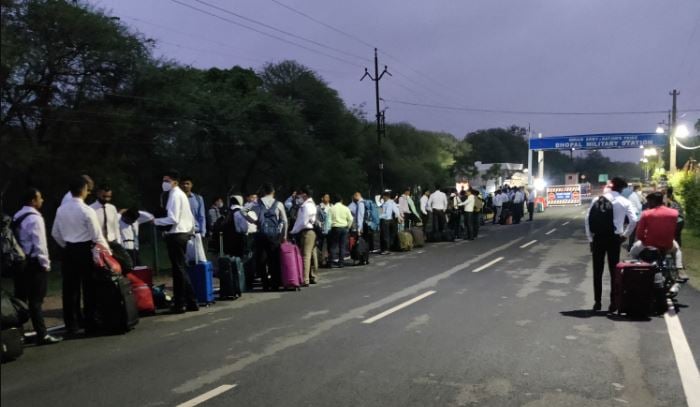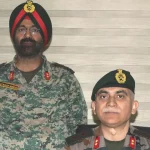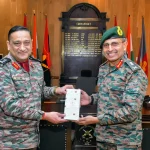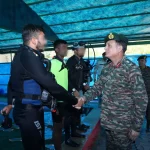SRT, or Situation Reaction Test, is a psychometric tool used in the selection process of the Services Selection Board (SSB) interview, which is conducted for the selection of candidates for the Indian Armed Forces. The SRT is one of the psychological tests conducted during the SSB interview to assess a candidate’s thought process, decision-making abilities, and how he handles different situations.
SRT in SSB Interview
The SRT consists of a series of 60 hypothetical situations, each described in a single line or a few lines, and the candidate is required to provide his immediate reaction or response to the given situation. The situations are designed to test the candidate’s response to the situations he may face during his service in the Armed Forces, such as handling pressure, decision-making in a crisis, leadership, and dealing with emergencies.
The SRT is conducted on the second day of the SSB interview and is timed. The candidate is given 30 minutes to read and respond to all the 60 situations. The situations presented in the SRT are very diverse, and they can range from common everyday scenarios to more complex situations.
The SRT is a very important tool used by the SSB to evaluate a candidate’s personality traits, such as intelligence, judgment, common sense, initiative, courage, and quick decision-making abilities. The responses given by the candidate to the different situations presented in the SRT are evaluated by trained psychologists and assessors. The assessors look for qualities such as self-confidence, presence of mind, analytical abilities, problem-solving skills, and the ability to take quick decisions under pressure.
There is no right or wrong answer to any of the situations presented in the SRT. The assessors look for the candidate’s thought process, approach, and his ability to analyze and respond to the given situation. However, it is important for the candidate to provide a logical, feasible, and practical solution to the given situation.
The SRT is a test of a candidate’s psychological suitability for a career in the Armed Forces. It helps assessors to determine whether the candidate has the qualities required for a successful career in the Armed Forces. It is, therefore, essential for candidates to be well-prepared and have a clear understanding of the qualities and skills that are required to succeed in the SRT.
Most Common Situation Reaction Test
- He is walking down the road and he sees a stranger collapsed on the road. What would he do?
- He is standing in a queue and someone tries to jump ahead of him. How would he react?
- He is on a boat that is about to capsize. What would he do?
- He sees a person stealing something in front of him. What action would he take?
- He is at a party and someone offers him a drink. What would he do?
- He witnesses a road accident. What would he do?
- He finds a wallet lying on the road. What action would he take?
- He is in a situation where his team members are not cooperating. What steps would he take?
- He is in a situation where he is asked to do something that he is not comfortable with. What would he do?
- He is in a situation where his family member needs medical attention urgently. What would he do?
- He is in a situation where he is running late for an important meeting. What steps would he take?
- He is in a situation where he is asked to do something illegal. What would he do?
- He is in a situation where he is accused of something that he did not do. How would he react?
- He is in a situation where he is asked to compromise on his principles. What would he do?
- He is in a situation where his colleague is being bullied. What action would he take?
- He is in a situation where he is asked to work with someone he doesn’t get along with. How would he handle the situation?
- He is in a situation where he has to work in a team with people from different backgrounds. How would he manage the situation?
- He is in a situation where his supervisor is unfair towards him. What steps would he take?
- He is in a situation where he is asked to choose between his personal life and professional life. What would he do?
- He is in a situation where he is asked to work on a project that he has no knowledge about. What would he do?
- He is in a situation where his friend is cheating in an exam. What would he do?
- He is in a situation where he has to choose between two conflicting opinions. What would he do?
- He is in a situation where he has to prioritize between two important tasks. How would he manage the situation?
- He is in a situation where he has to handle a difficult customer. How would he handle the situation?
- He is in a situation where he has to give bad news to someone. What approach would he take?
SRT Sample Answers
- He would immediately rush to the stranger and check their condition. He would call for medical assistance or try to help the stranger in any way possible until help arrives.
- He would calmly explain to the person that jumping the queue is unfair and politely ask them to go back to their original position. If the person persists, he would seek assistance from the authorities or the queue supervisor.
- He would quickly grab a life jacket or any floating object, and help others on board to do the same. He would follow the safety protocol and listen to the instructions of the boat crew, and try to stay calm and help others during the situation.
- He would immediately report the incident to the authorities or security personnel and try to give a detailed description of the person and the situation to assist in the investigation.
- He would politely refuse the drink and instead opt for a non-alcoholic beverage or water. He would continue to socialize and engage with others without feeling the need to consume alcohol.
- He would quickly call the emergency services and try to provide assistance to the injured or those in need, while also ensuring his own safety.
- He would try to locate the owner of the wallet, and if unable to do so, he would turn it in to the authorities or lost and found department, so that it can be returned to its rightful owner.
- He would try to communicate with his team members and understand their perspective, while also expressing his own concerns and trying to find a mutually agreeable solution. He would also try to take the lead and motivate the team to work together.
- He would respectfully decline to do the task and explain his reasons to the person who requested it, while also suggesting alternate options or solutions.
- He would immediately arrange for medical attention and do whatever is necessary to ensure the safety and well-being of his family member.
- He would try to inform the concerned parties about the delay and arrive at the meeting as soon as possible, while also ensuring that he doesn’t violate any traffic laws or rules.
- He would refuse to do anything illegal and report the matter to the authorities or his superiors, if necessary. He would also try to maintain his integrity and remain true to his values and principles.
- He would calmly explain his innocence and try to provide evidence to support his claim. He would also cooperate with the authorities or any investigation process that may be required.
- He would stick to his principles and not compromise on them, even if it means facing consequences or opposition.
- He would try to support his colleague and offer any assistance or help necessary. He would also report the matter to the authorities or his superiors, if necessary.
- He would try to remain professional and respectful towards the person, while also communicating effectively and finding ways to work together towards the common goal.
- He would try to learn about and understand the different backgrounds of his team members, while also acknowledging their unique strengths and contributions. He would try to create an inclusive environment that values diversity and promotes collaboration.
- He would try to address the issue with his supervisor in a respectful and constructive manner, while also suggesting possible solutions or seeking help from higher authorities, if necessary.
- He would try to find a balance between his personal and professional life, while also considering the impact of his decision on himself and others.
- He would try to learn and gain the necessary knowledge and skills to work on the project, while also seeking guidance and assistance from experts or colleagues.
- He would refuse to condone cheating and try to explain to his friend the negative consequences of cheating, while also offering help and support if needed.
- He would try to listen to and understand both opinions, while also considering the facts and evidence
The SRT is an important tool used by the SSB to evaluate a candidate’s psychological suitability for a career in the Armed Forces. It is an opportunity for the candidate to showcase his personality traits and decision-making abilities. Candidates need to be well-prepared for the SRT, as it is a timed test, and they are required to respond to a large number of situations. The SRT is just one of the many tests conducted during the SSB interview, and a candidate’s performance in the SRT is evaluated along with his performance in other tests to determine his suitability for a career in the Armed Forces.














